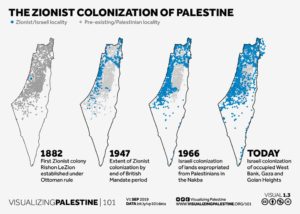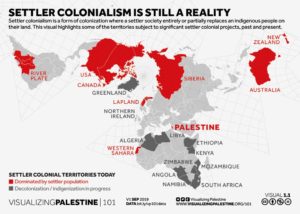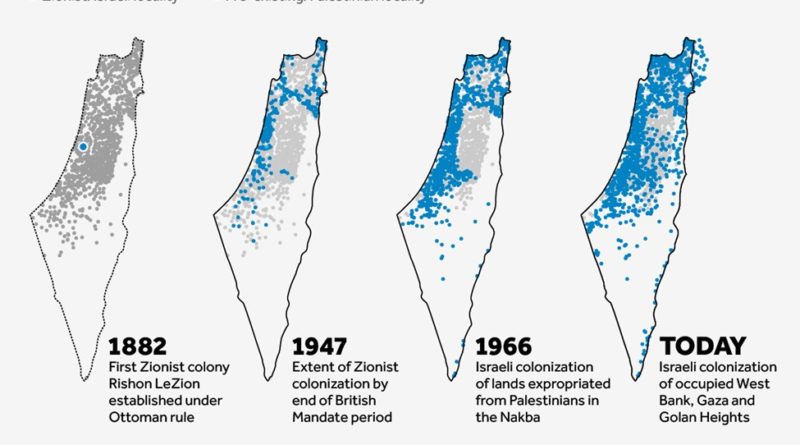Israel/Palestine: A Settler Colonial State by Katherine Cunningham and Noushin Darya Framke

INTRODUCTORY NOTE FOR THIS WEEK: The 2017 General Council of the World Communion of Reformed Churches (WCRC) received a call from the Palestinian Christian community to respond to the continuing crisis in their homeland. The assembly responded with Action 55 which, among other things, states that the General Council should “undertake study and discernment, using the resources available from member churches and the ecumenical movement, regarding theology that has been employed to legitimate the oppression of the Palestinian people, recognizing that such a study might result in the need for prophetic action.”
Heeding that call, a mandate was issued to collect resources and engage in sharing those with a particular focus on how theologies are used to legitimate the continuing oppression of the Palestinian people. This new resource—Focus: Palestine—is the result. It will be excerpted in Ecclesio this week. It is a comprehensive resource, spanning three parts, an extensive appendix, and linked videos. All of it may be freely downloaded, reproduced, and distributed for non-profit use with proper attribution.
“Hear the Palestinian address to the church. Listen to their stories and struggles; see their hope and resilience. And then, ‘Go and Tell,’ and boldly act. It is our hope that this handbook will encourage you in that truth-telling. May it be a pilgrimage of the heart, but even more, a journey into solidarity and justice.” —co-authors Katherine Cunningham and Noushin Darya Framke
“The expulsion of over half the Arab population of the country, first by Zionist militias and then by the Israeli army, completed the military and political triumph of Zionism. Such radical social engineering at the expense of the indigenous population is the way of all colonial settler movements. In Palestine, it was a necessary precondition for transforming most of an overwhelmingly Arab country into a predominantly Jewish state…. The modern history of Palestine can best be understood in these terms: as a colonial war waged against the indigenous population, by a variety of parties, to force them to relinquish their homeland to another people against their will.”
Rashid Khalidi, The Hundred Years’ War on Palestine, 2020
Rashid Khalidi, historian of Modern Arab Studies at New York’s Columbia University, explains that “successful” settler colonial projects become nation states, as in the examples of the US and Australia, reminding us that being a nation-state does not preclude being a settler colonial one. Khalidi clarifies that Israel is a unique settler colonial state with differences from others before it, but nevertheless, according to Zionist descriptions, it has always intended to colonize the land and remove the people.
Ilan Pappe, Israeli historian and author of The Ethnic Cleansing of Palestine, points out that settler colonial projects are motivated by what Patrick Wolfe defined as “the logic of the elimination of the native.” These colonization projects are for creating a new homeland, which will inevitably put the settlers on a collision course with the local native population, which in some cases will lead to their elimination. Pappe writes, “Britain granted international legitimacy to Zionist colonisation, sowing the seeds for the future dispossession of Palestine’s native population.”[1] He continues:
Zionism in Palestine is a settler-colonial project, and Israel remains to this day a settler-colonial state. This depiction is now widely accepted in the scholarly world, but rejected by mainstream Israeli scholars. On 2 November 1917, Arthur Balfour, then British foreign secretary, endorsed the idea of a “national home for the Jewish people” without “prejudice” against the “civil and religious rights” of the “non-Jewish communities in Palestine.” While this might imply that Jews were the native and majority population of Palestine, in reality, they comprised 10 percent of the population. This misrepresentation of the Palestinian reality in the Balfour Declaration shows how applicable the settler-colonial paradigm is to the case of the Zionist movement in Palestine. The settler movement obtained the support of a colonial and imperial power, one that it would disown from 1942 onwards, and shared the perception of the local population as —at best— a tolerated minority, and at worst as usurpers. Britain granted international legitimacy to this act of colonisation, sowing the seeds for the future dispossession of the native population.
It cannot be denied today that the goal of the creation of Israel, a Zionist project as a home for the Jewish people, is to eliminate the native Palestinian population and to grow the Jewish numbers by means of immigration from around the world. Israel denies the “right of return” to Palestinian refugees and diaspora, which is a right enshrined in the Declaration of Human Rights. At the same time, Israel gives automatic Israeli citizenship to any Jewish immigrant from any country in the world. This kind of discrimination is advanced further by the 2018 Nation State Law, which codifies discrimination into their legal system, declaring Israel a “Jewish State” and claiming “the right of national self-determination in the State of Israel is unique to the Jewish people.” Fully twenty percent of Israel’s population is Palestinian and not Jewish, and if you consider all the people under the control of the Israeli government, that numbers rises to fifty percent. So after the 2018 Nation State Law, the pretense is gone and discrimination is in the law.
Is Israel a Colonial State?
Three scholars demonstrate how Israel is and always was a settler colonial state, with aspects unique and apart from other such states.
(Professors Khalidi, Pappe, and Trachtenberg)
Israel displays many other characteristics of settler colonialism, as illustrated in Patrick Wolfe’s 2006 “Settler Colonialism and the Elimination of the Native.” For example, Wolfe cites:
- Despite Zionism’s chronic addiction to territorial expansion, Israel’s borders do not preclude the option of removal [of Palestinians].
- As the logic of elimination has taken on a variety of forms in other settler-colonial situations, so, in Israel, the continuing tendency to Palestinian expulsion has not been limited to the unelaborated exercise of force…. Israeli officials have only permitted family unions “in one direction—out of Israel.”
- …As Palestinians become more and more dispensable, Gaza and the West Bank become less and less like Bantustans and more and more like reservations (or, for that matter, like the Warsaw Ghetto).
In the journal Ethnic and Racial Studies, Nadim Rouhana argues in his article, “Decolonization as reconciliation: rethinking the national conflict paradigm in the Israeli-Palestinian conflict” that “the premise of national conflict is fundamentally flawed, and, therefore, reaching a settlement based on partition —let alone reconciliation— is becoming increasingly unlikely.” He posits that “a new paradigm is needed that applies a settler-colonial framework to the conflict…. Reconciliation in this conflict is conceived as decolonization within a transitional justice framework.” In other words, if it is colonization, then the way out is decolonization.
The Way Forward: Decolonization
Lament serves as a crucial expression of worship because it is truth telling before God.
Mark Charles, Navajo Indian theologian[2]
In December 1960, The United Nations adopted the Declaration on the Granting of Independence to Colonial Countries and Peoples. Also known as the 1960 Declaration on Decolonization, it affirmed the right of all people to self-determination and proclaimed that colonialism should be brought to an end. Followed by targeted decades of implementation, in 1988, the UN called for the Eradication of Colonialism.
A process of decolonization is needed. But what does it mean to decolonize a country and people who have been living under colonial rule for decades, even centuries? If it is about reclaiming what was taken, then there are concrete steps to take to honor what once was. But correcting the sins of the past normally begins with repentance, followed by lamentation. These are theological steps that are part of truth telling before God. When the colonizer takes ownership of the abuses inflicted on the colonized, a healing process can begin.
A model of partnership and cooperation is the beginning of a long road to dismantling oppressive structures that only favor the rich and the powerful, including the church. Jesus empowers the poor, the weak, and the oppressed, and moving to a model based on the authentic gospel of Christ will also move us to that which dismantles colonized places and spaces.
Although Palestine does not show up on UN maps of non-self governing territories, it does not have self-determination. It is now argued that Israel/Palestine is not a “conflict” but a settler colonial project. Palestine is a place and people under the control of another country. Since Israel controls the borders, resources, economy, and movements of Palestinians, they do not have self-determination or sovereignty. Palestine fits the UN parameters and the need to “eradicate colonialism.”
What is the Endgame?
We Christians have a faith mandate to untangle the knots and find a solution that honors the Palestinians’ need for justice and peace and Israel’s need for security and peace. God demands of us faithfulness in this work.
Naim Ateek, Palestinian Liberation Theologian[3]
The arc of the moral universe is long, but it bends towards justice.
Rev. Dr. Martin Luther King, Jr.
Justice is the ever-present theme that runs through liberation theology, but especially Palestinian Liberation Theology. As with any other people living under years of occupation and colonization, Palestinians have turned from calling for an end to the occupation to calling for human rights for all people, Israeli or Palestinian, be they in the West Bank, Gaza, or within Israel’s 1948 borders.
To demonstrate a framework with justice for all parties, two experts, one Palestinian, one Israeli, offer their endgame visions of decolonization in two video episodes:
Jonathan Kuttab, Palestinian Christian, co-founder of Jerusalem’s al-Haq Center for Human Rights, and expert on International Law, offers a compromise “endgame” in his proposal, Beyond the Two-State solution. Kuttab explains, “Zionism and Palestinian Nationalism have been at loggerheads for over a century. Some thought the two-state solution would resolve the situation… [but] the two-state solution is no longer viable.” He suggests that any solution should be predicated on the basic existential needs of both peoples and formulates a way forward for a one-state solution that challenges both Zionism and Palestinian Nationalism.
click to WATCH VIDEO #7:
Beyond the Two-State Solution
Jonathan Kuttab, Palestinian Christian
and International Law Expert
Israeli anthropologist Jeff Halper, director of The Israeli Committee Against House Demolitions, is part of a group working on one “endgame” dubbed the ODS: One Democratic State. He argues that the only way out of a colonial situation is decolonization: the dismantling of Zionist structures of domination and control, and their replacement by a single democratic state in which Palestinians and Israelis forge a new civil society and a shared political community. He explains how this scenario is a good model for decolonization, and what decolonization would look like in Israel/Palestine.
Decolonization is the only way
out of colonization
Jeff Halper, Israeli Anthropologist
[1]Ilan Pappe, “From Balfour to the Nakba: The settler-colonial experience of Palestine”, Middle East Eye, November 4, 2020.
[2] Mark Charles and Soon-Chan Rah, Unsettling Truths: The Ongoing, Dehumanizing Legacy of the Doctrine of Discovery (Downers Grove, Illinois: InterVarsity Press, 2019).
[3] Naim Ateek, A Palestinian Cry for Reconciliation (Maryknoll, New York: Orbis Books, 2008).


